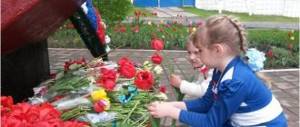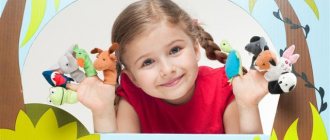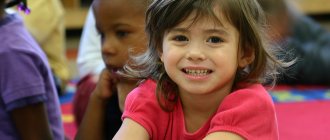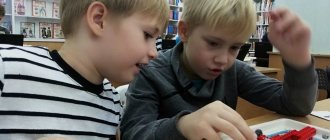Cultivating the basics of tolerance in preschoolers (from the experience of a kindergarten)
Cultivating tolerance is one of the most important problems today.
Recently, discussions have often arisen about a tolerant world, the so-called world without violence and cruelty, in which the main value is the unique and inviolable human personality.
The relevance of the problem of tolerance is due to the fact that today the values and principles necessary for general survival and free development of the individual are coming to the fore. Therefore, in our work we strive to form moral values in children, which are the most important indicators of the integrity of an individual who is capable of creating their own idea of their future life path.
At the present stage of development of society, the need has arisen to form a culture of tolerance among the younger generation, starting from preschool age.
The formation of this most important quality occurs already in childhood in the context of family and educational institutions, and continues throughout life with the development of education.
Definition of the word "tolerance":
In Spanish
- ability
acknowledge ideas and opinions different from your own;
In French
- an attitude in which it is accepted that others may think or act differently than oneself;
In English
– willingness to be tolerant, condescending;
In Chinese
– allow, accept, be generous towards others;
In Arabic
– forgiveness, forbearance, gentleness, mercy, compassion, benevolence, patience, disposition towards others;
In Russian
– the ability to endure something or someone (to be self-possessed, hardy, persistent, to be able to put up with the existence of something, someone).
Ideas taken as a basis:
Treat others with respect.
Never think that your opinion is more important than the opinion of another person.
Do not impose your opinion on others, you can simply express it.
We must remember that everyone is free to choose their own image and style, their own habits and preferences (within the limits of decency).
Be able to see the value and originality of the culture of each nation.
In solving the problems of developing tolerance, a special role is assigned to preschool education and upbringing as the initial stage in the moral development of a child. Tolerance, respect, acceptance and a correct understanding of the world's cultures should be instilled at an early age, in kindergarten. Treating representatives of different nationalities with respect and respect is an integral condition of tolerant education, and we educators must bring to the consciousness of children that people are equal in their dignity and rights, although they are different in nature. The period of preschool childhood is very important for the development of a child’s personality: throughout the entire preschool period, mental functions intensively develop, complex types of activities are formed, and the foundations of cognitive abilities are laid.
Achieving this goal is possible by solving specific problems
, which are combined into two interconnected blocks:
| I. Raising children to be peaceful, accepting and understanding other people, the ability to interact positively with them: 1) the formation of a negative attitude towards violence and aggression in any form; 2) the formation of respect and recognition for oneself and for people, for their culture; 3) development of the ability for interethnic and interreligious interaction; 4) development of the ability for tolerant communication, for constructive interaction with representatives of society, regardless of their affiliation and worldview; 5) developing the ability to determine the boundaries of tolerance. | II. Creating a tolerant environment in society and in education: 1) prevention of terrorism, extremism and aggression in society; 2) humanization and democratization of existing relationships between adults and children, systems of education and upbringing; 3) inclusion of the leading ideas of the pedagogy of tolerance into the reform of education; 4) reforming the system of training future teachers to instill tolerance in children. |
Basic principles:
1. The principle of subjectivity. It requires support for the child’s independent activity, stimulation of his self-education, and conscious behavior in relationships with other people.
2. The principle of adequacy. Requires consistency between the content and means of education, and is focused on real relationships that develop between children, parents, and teachers.
3. The principle of a reflexive position. It assumes a focus on the formation in children of a conscious, stable system of relationships to a problem or issue that is significant to them, manifested in appropriate behavior and actions.
4. The principle of individualization. It involves determining an individual approach to the education of consciousness and behavior.
5. The principle of creating a tolerant environment. It requires the formation of humanistic relations in kindergarten, based on the right of everyone to have a unique attitude towards the environment, self-realization in different forms.
Principles of work content:
- —Comprehensive thematic approach to planning.
- —Personally-oriented interaction of participants in the educational process.
- —Integration of educational areas.
- —Use of forms of work with children appropriate to the age group.
- —Providing emotional and practical components of ethnotolerance.
- —Construction of a subject-development environment taking into account modern requirements.
Interaction of preschool educational institutions with families of pupils
Forms of tolerance education:
In order for the work on developing tolerance in preschoolers to be fruitful, it is necessary to involve a wide range of events and different types of activities for preschoolers.
Range of events and different types of activities for preschoolers:
1) holding holidays and other mass forms in order to introduce children to the culture and traditions of their people and the peoples of the world; theatrical activities of preschoolers according to scenarios based on fairy tales of the peoples of the world;
2) role-playing games for preschoolers, the main goal of which is the development and practical application by children of methods of tolerant interaction;
3) Russian folk outdoor games;
4) holding Russian folk holidays, for example, “Maslenitsa”, “Christmas” in accordance with the folk calendar;
5) study of folk holidays of the closest neighboring countries, Scandinavian folk holidays; holidays of the peoples of the East and Muslim countries; 6) introducing children to the traditions of peoples of different countries;
7) with the traditions of celebrating the New Year, May 1, April 1 in different countries;
 games-activities created on materials from various fairy tales in order to solve problems of interpersonal interaction in fairy-tale situations;
games-activities created on materials from various fairy tales in order to solve problems of interpersonal interaction in fairy-tale situations;
9) composing fairy tales and stories by the children themselves; fairy tale dramatizations.
Of course, the formation of tolerance occurred gradually, because all children are different: some are friendly, active, others are shy, others are reserved, each with their own individual abilities and characteristics.
During the classes we used a variety of methodological techniques:
1. Games and play exercises
aimed at:
— development of non-verbal communication skills: “Guess it”, “Favorite fairy-tale hero”;
- developing a sense of closeness with other children: “Tender name”, “Compliments”;
— development of skills aimed at recognizing the feelings of other people: “The sea is agitated”:
- harmonization of awareness of one’s name and surname: “How can we be called differently”, “Guess who it is?”;
— development of the ability to maintain distance in communication: “Standing and sitting”;
— developing the ability to understand the mood of others: “What can you do for a friend”;
— regulation of one’s behavior: “A self-controlled person”;
- manifestation of a sense of mercy, compassion for other people: “Sun of Mercy”, “Good Forester”,
2. Discussion and playback of situations
(problem situations) aimed at the practical application of cultural behavior skills in games, in classes, in public places, at the ability to express empathy and sympathy for adults and peers.
3. Etudes and exercises
aimed at:
- to foster humane and friendly relationships between children: “Gift”;
— fostering respect for people of different nationalities and races: “With our backs to each other,” “Round dance of friendship.”
4. Use of artistic words
: poems, teasers, proverbs and sayings, stories by foreign authors and fairy tales of the peoples of the world.
5. Using visual aids
: plot paintings, photographs, illustrations for fairy tales, drawings, diagrams and maps.
6. Productive activity
– drawing, on the topics: “Self-portrait”, “Me and my mood”, “My name”, “Flower of mercy”, “Children of planet Earth”,
7. An auxiliary technique is listening to music, children's songs, national music of different nations.
Work with children:
- —Conversations
- —Projects
- —Design
- —Video views
- -Excursions
- —Targeted walks
- —Folklore and themed holidays
- —Theatrical performances
Working with parents.
The work of instilling tolerance in children requires close cooperation between kindergarten teachers and parents. To do this, we used various forms of work with parents: meetings, consultations, exhibitions of pedagogical and children's fiction, photo stands, joint holidays, excursions, entertainment, individual conversations with parents. Such consistency in the work of the kindergarten and the family is the most important condition for the full upbringing of a child, the formation of his moral forms of behavior, and legal culture.
- Questioning
- —Joint holidays
- —Round tables
- —Competition “My Pedigree”
- —Collaborative drawing competitions
- -Exhibitions
— Cooperation between preschool educational institutions and families is a priority in the formation of tolerant behavior in preschoolers, ensuring the educational process and real interaction between the child’s parents and society.
— Activities with parents:
- - round table;
— — trainings, family game libraries;
— — thematic days at preschool educational institutions;
— — advisory point;
— — “School for parents”;
— — “Nadezhda” club together with the “Danko” social protection center.
— — targeted excursions together with children around the city.
A project has been developed to develop tolerance in children of senior preschool age “Tolerance is the road to peace!”
As part of solving the problems of multicultural education, interaction with social institutions was provided:
– social;
— the senior citizens’ club “At the Samovar”;
— Cossack society “Stanitsa Pokachevskaya”;
— the “Echo of Generations” movement;
- local history museum;
- exhibition hall.
The cycle of ongoing events allows us, in the conditions of a preschool institution, to form in preschool children an idea of regional characteristics and other cultural differences, as well as to introduce people of another culture, other traditions living in a given area to the perception, while simultaneously finding in them universal human values (kindness, friendship, honesty, love, justice, mutual assistance).
The purpose and objectives of the project.
Target
: Formation of the foundations of a tolerant culture for the personality of a preschooler, teacher and parent.
Tasks
:
1. Creating conditions in preschool educational institutions for the formation of tolerance in children, teachers, and parents.
2. Development of communication abilities as the main feature of a person with a tolerant consciousness.
3. Organization of systematic work to form a positive attitude towards the surrounding world, representatives of different nations, older people and people with disabilities.
4. Formation of the child’s ideas about himself as a unique, self-valuable, unrepeatable personality and the cultivation of an active life position based on:
• the child’s awareness of his needs (physical, spiritual), developing the ability to satisfy them without harming others;
• awareness of one's capabilities; formation of the ability to act in accordance with them, the desire to develop them;
• awareness of one's strengths and weaknesses; manifestations of criticality;
• awareness of their rights and responsibilities to themselves and other people;
• developing the ability to evaluate one’s own actions and the actions of others; the ability to make choices and decisions; listen to the opinions of others; resolve emerging problems peacefully and without conflict;
• deepening understanding of the significance and value of each person's life;
• developing the ability to defend one’s rights and take into account the rights of others, to show tolerance, respect for the traditions and culture of others;
• defining, together with children, the rules and norms of human society (familiarity with the concepts of “rules”, “law”, “norm”, “requirements”, “traditions”, “respect”).
5. To form the motivational, theoretical readiness of parents, educators and all interested subjects of the educational process to implement a system of forming the foundations of tolerance in children of the seventh year of life.
6. Develop a system of productive interaction between participants in the educational process and social partners.
The project is based on general pedagogical and private principles of tolerance education
:
- focus;
— individual and age characteristics
— cultural conformity;
— the unity of the socially organized educational process and real life experience;
— respectful attitude towards the individual;
- positive traits of the child;
— social conditionality of the process of education of tolerance;
— unity of knowledge and behavior;
— dialogue and cooperation;
- reflections.
Also, work on the project assumes continuity
working with schools to improve the quality of work on tolerant upbringing and education of children.
Week “Children of the whole Earth are friends”:
Conversations with children about the history of the holiday: “National Unity Day.”
Story, conversation, examination of illustrations, photos on the topic: “Friendship of peoples of different nationalities, national customs of peoples.”
Conducting outdoor national games.
Exhibition of children's works "We are different, but we are friends."
Musical and sports event “Children of the whole Earth are friends.”
Stand design “I’m small, but I have the right.”
A selection of didactic games on legal education, fairy tales, poems.
Design of a card index of games of the peoples of the world.
Poster competition on tolerance “Tolerance is the road to peace.”
Organization of a week of national cuisine.
Joint celebrations and entertainment
Our preschool educational institution took an active part in the city festival “Ugra - it’s you and me!”
Implementation of the project for interaction with older people “Wisdom is near us”.
Touching the roots of Russian folk art evokes strong emotions in children, makes them empathize, and attentively pay attention to the memory of the past, to their historical roots.
MBDOU DSKV "Ryabinushka" and the club "At the Samovar" decided to introduce a tradition of holding joint events in kindergarten.
Our project is aimed primarily at developing a spiritual and emotional connection between children and elderly people of our city, who came to Pokachi very young, lived and worked here for many years.
The project is necessary to develop a positive attitude towards older people. Activities within the project are a long-term creative collaboration between MBDOU DSKV “Ryabinushka” and the club “At the Samovar”. As a result of the work, a team of like-minded people was formed from members of the “At the Samovar” club and the kindergarten staff - children, teachers, parents.
The purpose of this project:
Forming a positive attitude of preschoolers towards the older generation as respected members of society through introducing them to active cooperation, through explaining to preschoolers the meaning of the wisdom of an older person.
Tasks:
1. Develop emotions and motives that contribute to the formation of respect for older people.
2. Contribute to expanding your circle of communication with adults.
3. Develop communication skills; tactfully and respectfully address kindergarten guests and listen to them carefully.
4. Cultivate a caring attitude towards older people.
5. Support and develop manifestations of humanity in the behavior of children.
6. Form interest in public life.
7. Strengthen knowledge about family traditions and establish continuity between generations.
8. Involve older people in joint activities with children and kindergarten staff to conduct a series of joint activities.
Implementation of the project “Kindness will save the world”:
Objective of the project:
Organization of interaction between preschool children and children with disabilities in a preschool educational institution.
Children with developmental disabilities participate in walks, sports, artistic and aesthetic entertainment, and other activities together with normally developing children. They have the opportunity to visit age groups, environmental, fine arts, theater studios, and a gym. At the same time, children with developmental disabilities are included in various types of activities (games, art, music and rhythm, etc.) together with the pupils of these groups. This model is the first stage of integration, when the initially existing distance between children can gradually decrease. Communication contributes to the inclusion of social adaptation
to life, the formation of a model of behavior in society. Communication between preschool children and disabled children is a kind of “school of morality” aimed at developing responsiveness, mutual understanding, and humanity.
Kindness Week
The teachers reflected with the pupils about important moral values: goodness, respect, love. Classes on moral education showed each child how important such qualities as kindness, mercy, good-heartedness are in the life of every person.
In the younger groups, children learned that animals must be treated with love and care, and that even the slightest suffering should not be caused to any living creature. Those heartless people who throw cats and dogs into the street and condemn them to torture are worthy of condemnation. We need to show concern for homeless animals and help them survive.
In older preschool groups we talked about friendship, kindness, good and kind deeds. Now everyone knows: to believe in good, you need to start doing it. After all, goodness is primarily associated with the ability to rejoice and have compassion, sympathize, empathize, respond to the feelings of others and keep your soul open.
Month of defense-mass and sports work.
Objectives: To develop in children a sense of love for their native land and its history.
Formation of ideas about Russia as a native country, about Moscow as the capital, education of patriotism, respect for the cultural past of Russia through aesthetic education, education of civic and patriotic feelings through the study of state symbols. Involving parents in participation in cultural events.
A week of theatrical performances.
Such fairy tales as “Under the Mushroom”, “How a Hedgehog Searched for Happiness”, “The Wolf and the Seven Little Goats”, etc. were presented.
Family Day Celebration
has become a traditional event in our kindergarten, which solves the important problems of instilling tolerance in children.
Great Victory Day.
Victory Day occupies a special place in the life of every Russian. Therefore, our kindergarten teachers clearly talk about the long and difficult path that preceded this significant day. On the eve of the holiday, we held a reading competition “We will always remember this...”. During the event, children watched the presentation “About War for Children,” listened to theme songs and read poems. A total of 26 children took part in the reading competition. All children were given gifts and sweet prizes. The prize winners received certificates. The event “We are proud and congratulations” was held. Children drew themed drawings about the Victory Day and congratulated the townspeople by posting greeting cards in public places in the city.
As a result, our graduates know that all people differ from each other in appearance and behavior, but also have similar traits (body structure, emotions); they are familiar with the ways of emotional support from a peer, an adult; they understand that the causes of conflict can be opposing interests, feelings, views, and have an idea of possible ways to resolve conflicts. Children can understand each other, realize their own value and the value of other people; show empathy and tolerance; be aware of how others feel about their actions; express your feelings and understand the feelings of others; find a constructive solution to the conflict. In this way, tolerant attitudes are fostered.
List of sources used:
https://nsportal.ru
https://dohcolonoc.ru
https://www.moi-detsad.ru
https://ped-kopilka.ru
"Present"
2015, Germany
A touching story about friendship united by common pain. In 4 minutes you will change your attitude not only towards your own life, but also learn to understand someone else’s, special one.
The short film The Present collected about 50 awards and was shown at more than 180 festivals, after which its creator, German animator Jakob Frey, made the cartoon publicly available.
The author commented:
Now that our successful festival journey has come to an end, we decided it was time to share our work with the world.



